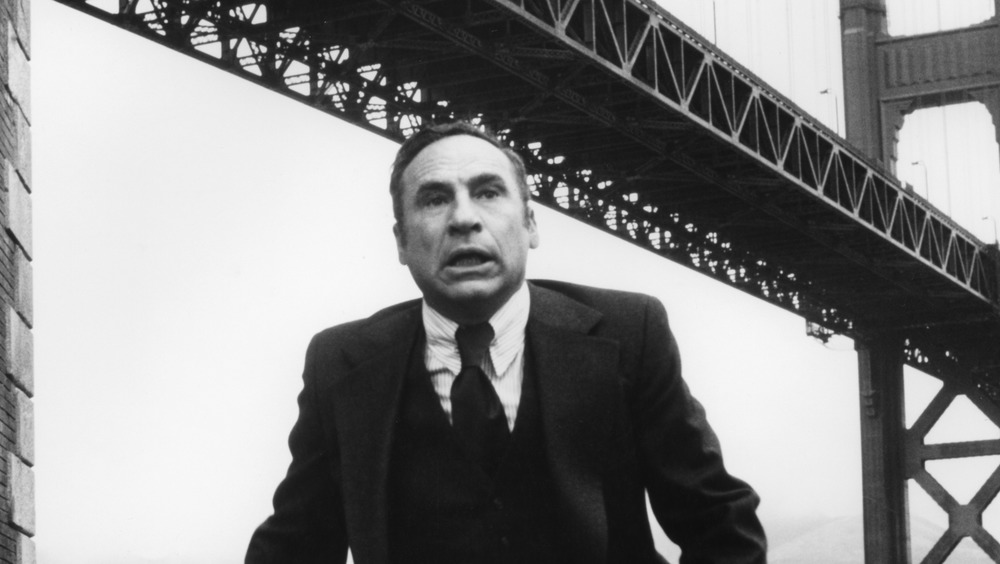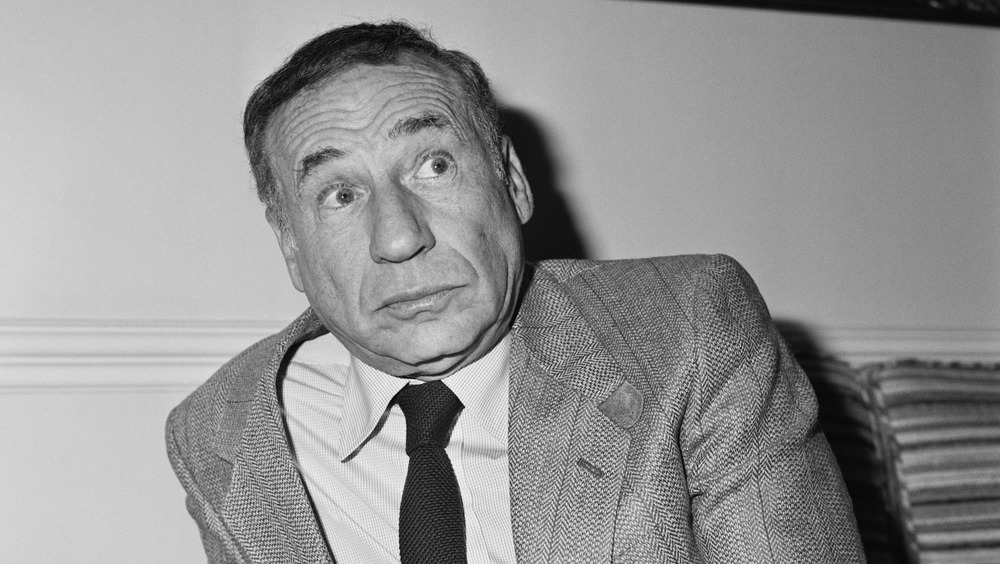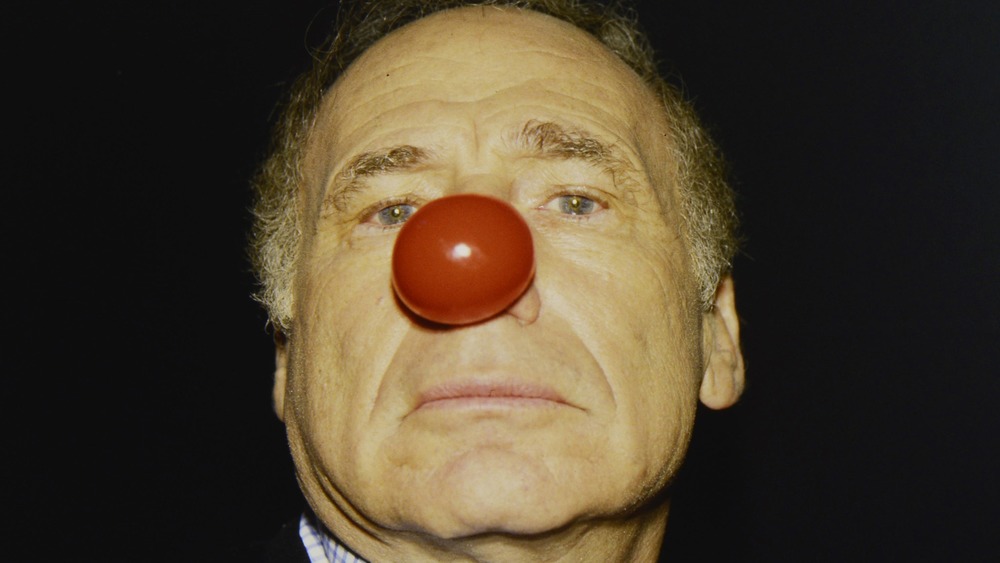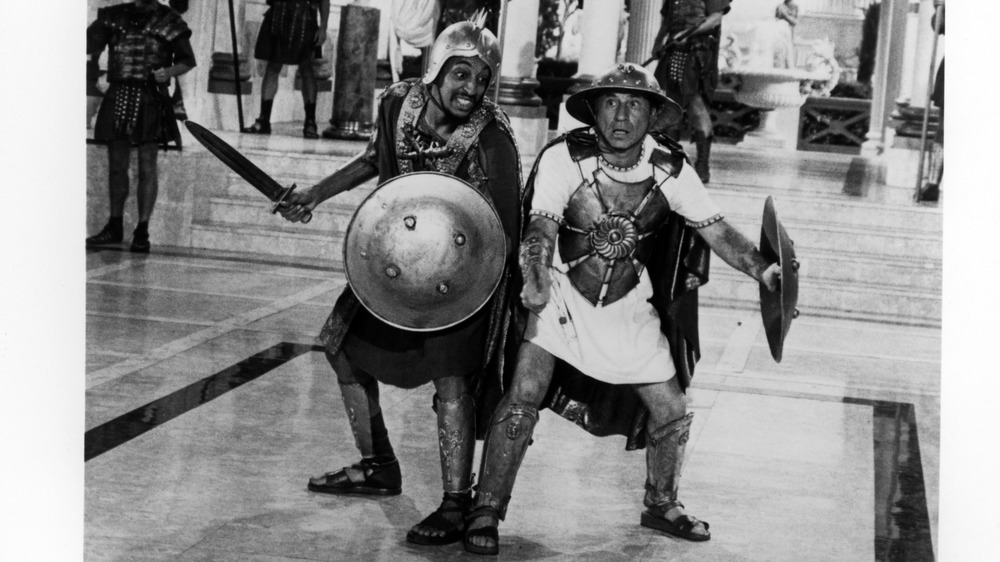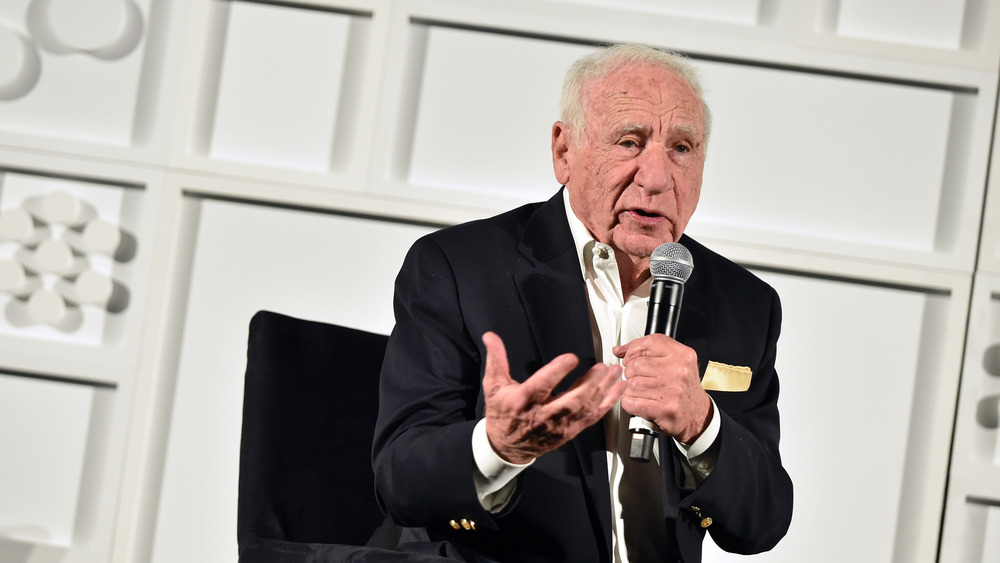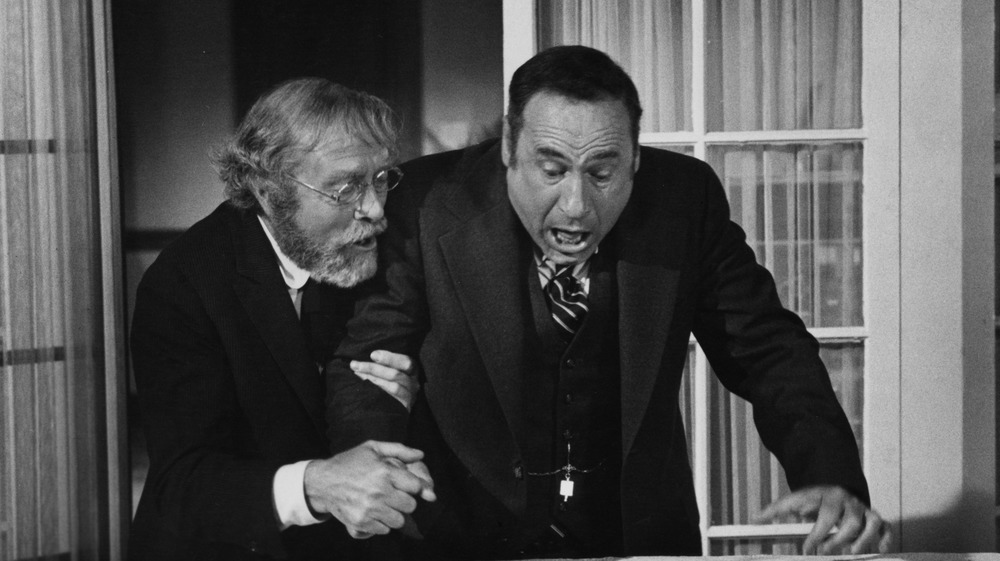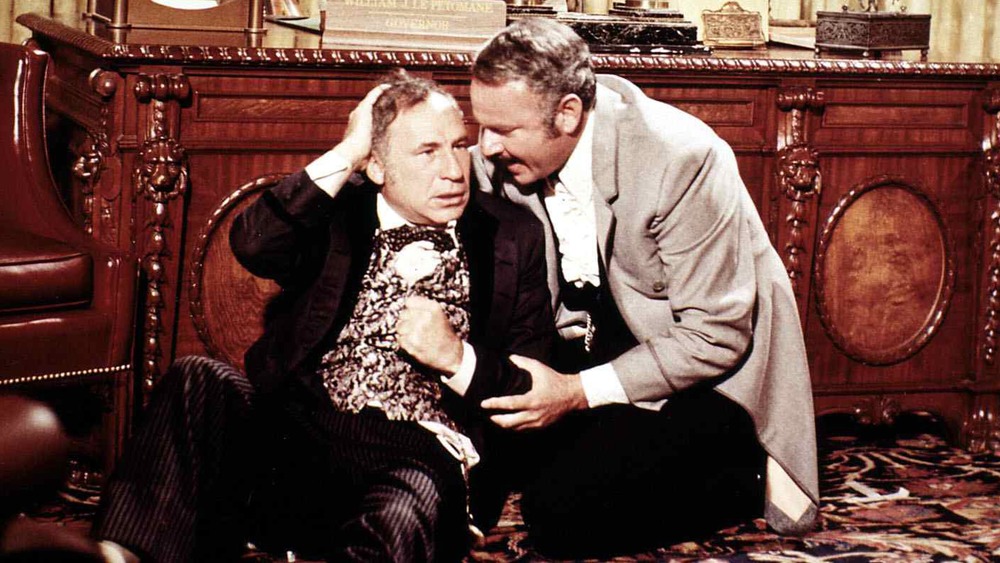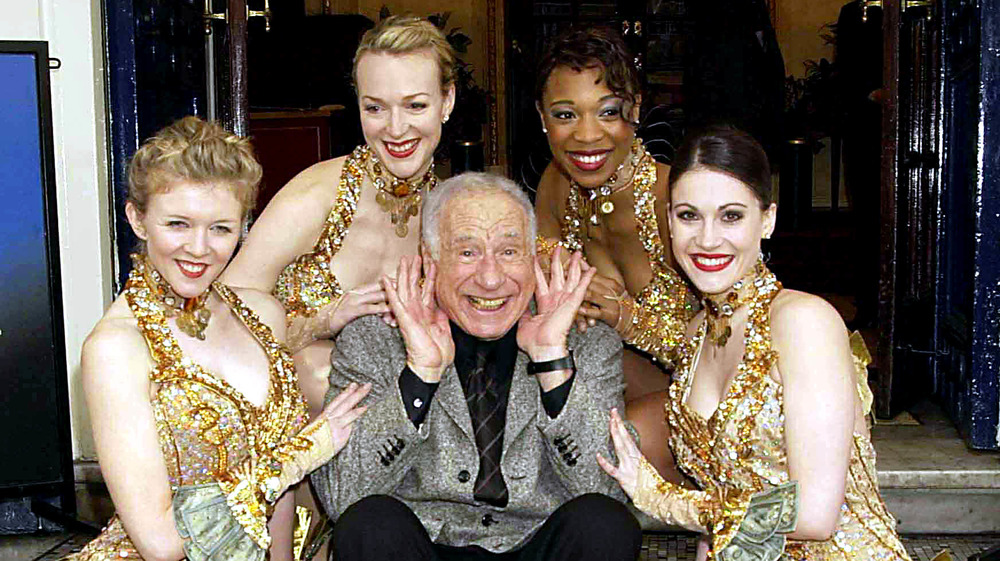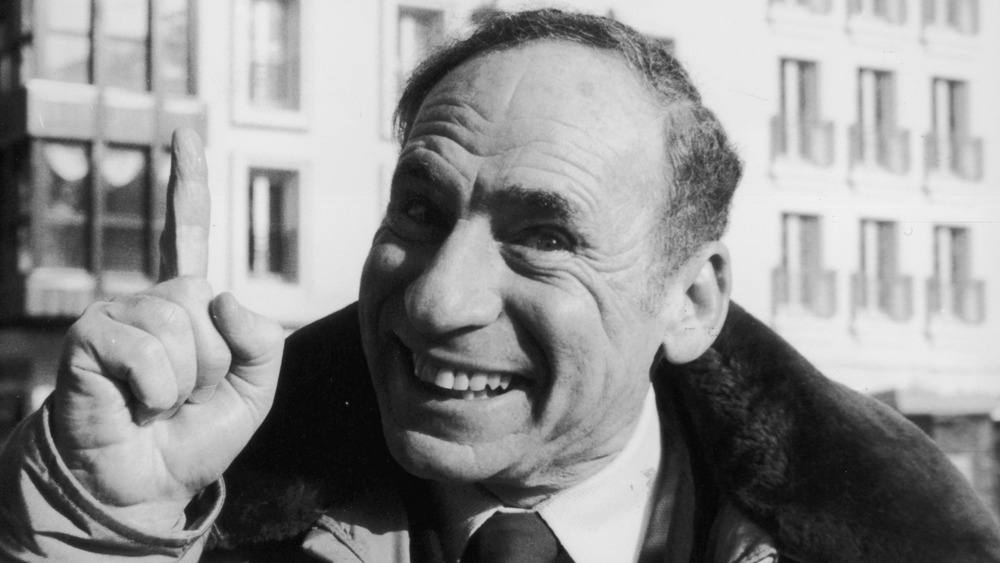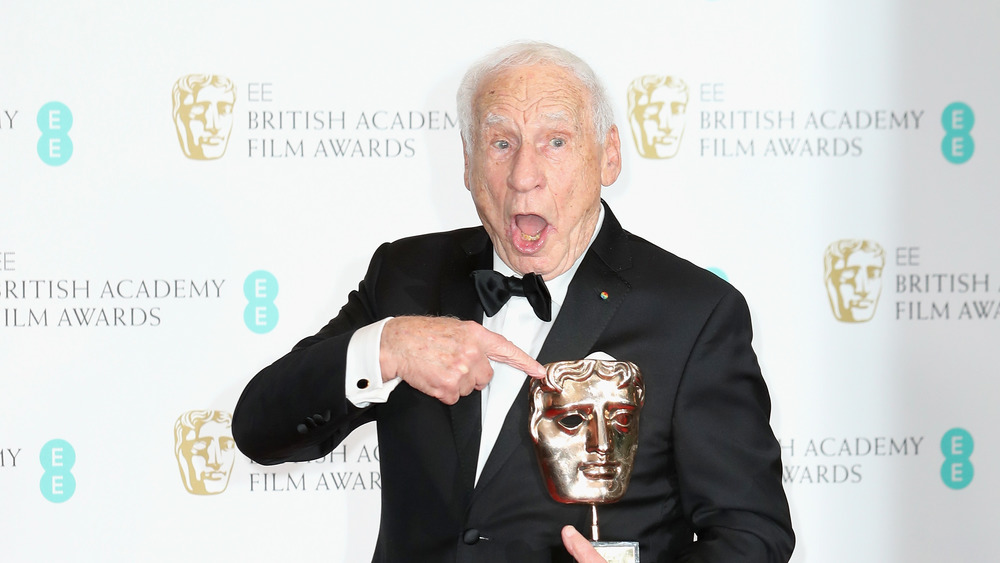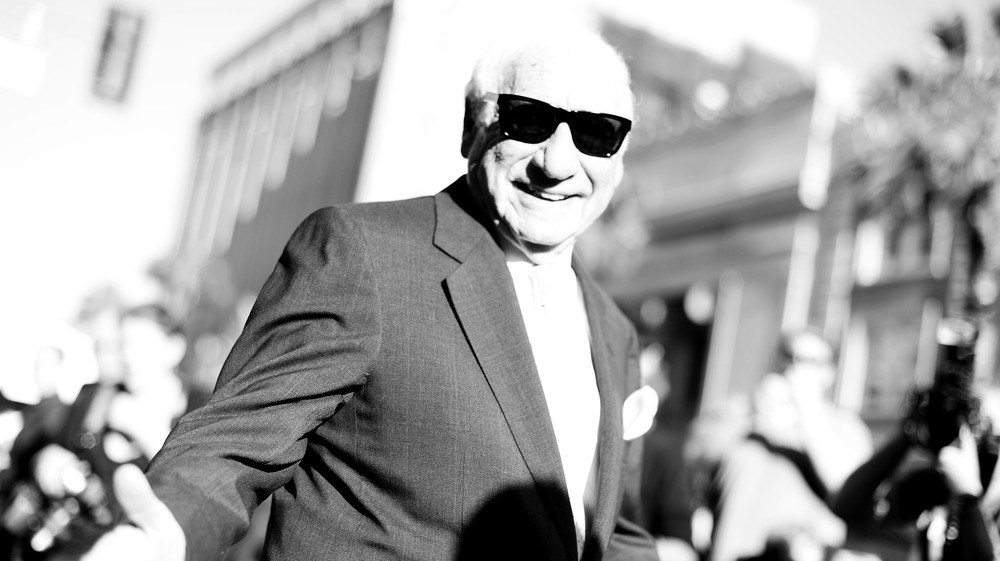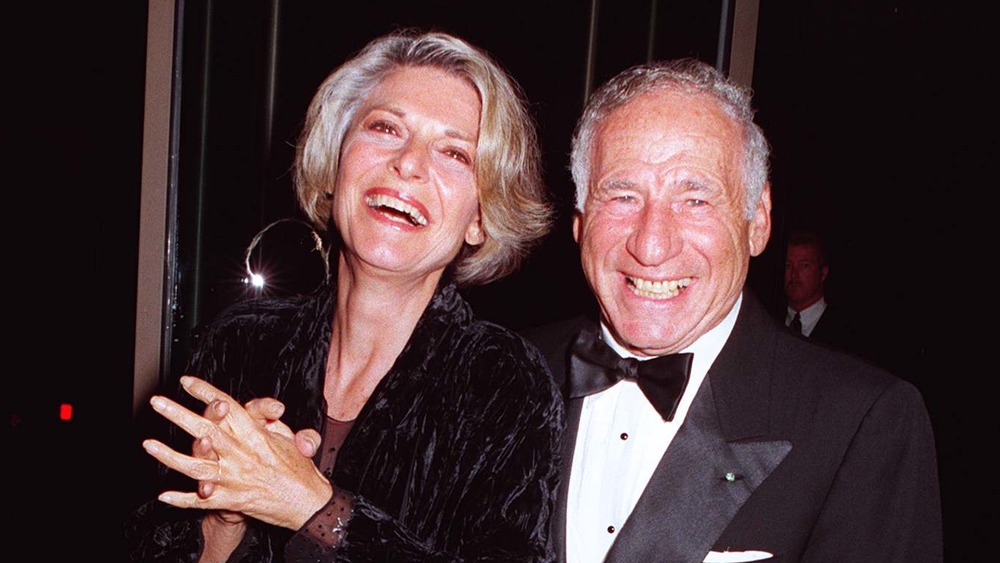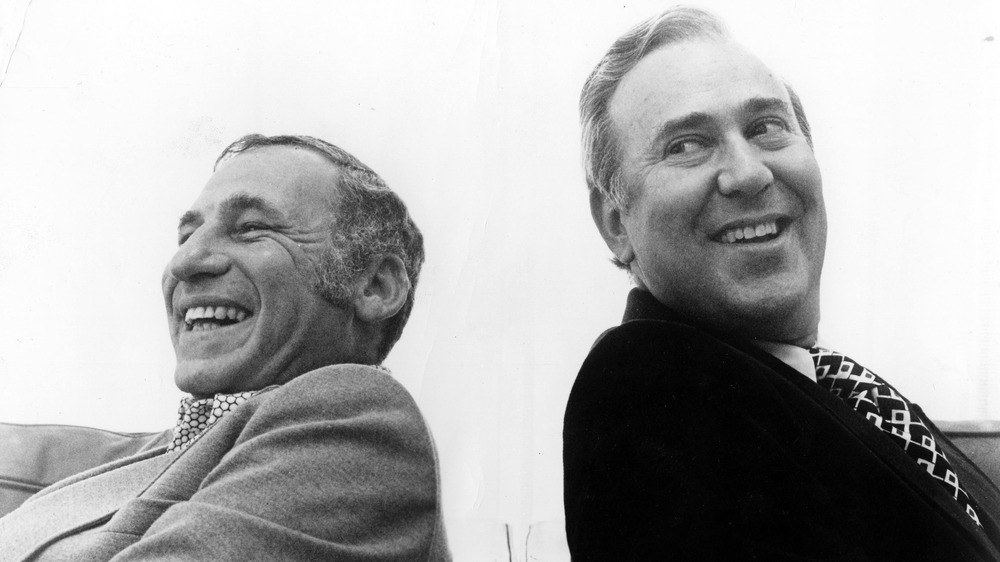The Tragic Real-Life Story Of Mel Brooks
The career of Mel Brooks has spanned eight decades. From age 14 when he started out as a comedian in the Catskills to his TV career in the 1950s and 1960s. He's worked with Sid Caesar and created his own show, Get Smart. His film career in the 70s, 80s, and 90s produced cult classics such as The Producers, Blazing Saddles, Young Frankenstein, The History of the World Part I, Spaceballs, and Robin Hood: Men in Tights, and he continues to perform and produce well into the current millenia. What some may not know is that the road to such legendary success was paved with tremendous failure and loss.
Brooks grew up poor in a tough neighborhood in Brooklyn. He often felt like an outsider for being Jewish, short, and unathletic, so he used comedy from a young age as a weapon of sorts to defend himself. Even while fighting in World War II, feeling the fear of not only being a soldier but a Jewish one, he turned to laughter. Then, during his many career ups and downs and dry spells, his insatiable desire to be loved alongside his endless energy to defeat his enemies with comedy persisted. After all it's Brooks that's known best for saying, "Tragedy is when I cut my finger. Comedy is when you fall into an open sewer and die."
When Mel Brooks was only 2, his father died
Mel Brooks came into the world first as Melvin Kaminsky, the youngest of four boys born on a kitchen table in his parents' Brooklyn tenement apartment in 1926. While many comedians are infamous for having terrible childhoods and using comedy as a way to seek attention, Brooks was the opposite. According to the book, It's Good to Be the King: The Seriously Funny Life of Mel Brooks, Brooks was used to being the baby of the family and constantly showered with love. It became a part of his personality, well into adulthood, to need to be at the center of attention at all times.
This attitude can be clearly seen in one of his most famous interviews for Playboy in 1975. From the beginning to the end of the interview, he rarely answered a question without making a joke — until he was asked about his father. He explained that his father died of "tuberculosis of the kidney" when Brooks was only 2 years old. When Brooks was asked about the intimacy of male relationships in Blazing Saddles, he said, "I can't tell you what sadness, what pain it is to me never to have known my own father... If only I could look at him, touch his face, see if he had eyebrows! Maybe in having the male characters in my movies find each other, I'm expressing the longing I feel to find my father and be close to him."
Mel Brooks used humor as a defense from bullying
In his 1975 Playboy interview, Mel Brooks said he and most Jewish kids in his neighborhood did not swim because they would get picked on by other kids. If they did go to the pool, they had to travel in packs to protect themselves. Even in his predominantly Jewish neighborhood, he was, in his own words, "scrawny." He said, "Why should they let this puny kid hang out with them? I gave them a reason. I became their jester. Also, they were afraid of my tongue. I had it sharpened and I'd stick it in their eye."
According to My Jewish Learning, Brooks' humor was inspired by feeling marginalized as a Jewish kid in America and the long-suffering history of the Jewish people. Brooks often felt he couldn't get the girl, because he wasn't tall enough or blonde enough. And when it came to the legacy of Jewish mourning, Brooks wanted to be the one that used laughter over tears. He said, "If your enemy is laughing, how can he bludgeon you to death?"
Mel Brooks was an actual warrior
Mel Brooks' mother, "Kitty" Kaminsky, had four sons, and all of them fought in World War II. According to History Collection, Brooks was anti-war, but he felt determined to fight because he thought the war was "just." He wanted to defend the Jewish people against Adolf Hitler and the Nazi regime. Brooks has never considered himself a hero for his time serving, only that it was the right thing to do at the time.
Due to high marks on the Army's intelligence test, Brooks was trained to be an engineer. He often repaired or built bridges, all while being shot at by the enemy. The job included sweeping for mines. Brooks said, "You take a bayonet, and you look for mines — planted mines. And they could blow a tank, I mean they're big. You find them, unearth them ... if it could blow up a tank, it could certainly take away a Jew in no time." On occasion, Brooks had to stop working to participate in combat. He fought in the Battle of the Bulge, which is considered one of the war's most important battles.
Mel Brooks faced anti-Semitism in the Army
Ironically, Mel Brooks joined the Army to fight anti-Semitism but often faced it from his fellow soldiers. According to CBS News, Brooks said they would tell him, "'Jewboy! Out of my way, out of my face, Jewboy.'"
When asked how one could "get even" with Adolf Hitler he said, "You have to bring him down with ridicule, because if you stand on a soapbox and you match him with rhetoric, you're just as bad as he is, but if you can make people laugh at him, then you're one up on him. It's been one of my lifelong jobs — to make the world laugh at Adolf Hitler."
Before Brooks made a career making fun of Hitler, he did his best while serving in the Army. According to Military.com, Brooks would play Al Jolson, a Jewish singer, over a loudspeaker while the Germans played their propaganda. Being a Jewish-American fighter came with an additional risk when getting caught by the enemy. Brooks told a story about his brother Lenny whose plane was hit and had to use his parachute. While falling, Lenny took off his dog tags because they had an "H" for Hebrew on them. Some thought if a Jewish-American soldier was taken, they could get sent to the concentration camps (via History Collection).
Mel Brooks had "High Anxiety" in real life
Mel Brooks got his start in comedy at age 14 by working as a drummer, which led to the decision to change his last name because Kaminsky was too long to fit in writing on the drum. One night, while playing in the Catskills, he subbed for another comic who had fallen ill. Sweaty and unsure, he found a way to make the audience laugh. While in the war, Brooks used his comedic and musical sensibilities to entertain the troops. It was not until the 1950s when Brooks got his first steady gig in comedy working as a writer on Sid Ceasar's Your Show of Shows, and with it came a lot of anxiety.
In his 1975 Playboy interview, Brooks described his contributions to the show as full of "energy and insanity." He felt tremendous pressure, being amongst some of the funniest writers of the time. When asked if some of his "wild behavior" on the show was rooted in any type of mental health issue, Brooks said, "I started having acute anxiety attacks. I used to vomit a lot between parked Plymouths in midtown Manhattan. Sometimes I'd get so anxiety-stricken I'd have to run, because I'd be generating too much adrenaline to do anything but run or scream." Brooks sought therapy and said it helped him to calm down and grow up.
Mel Brooks and his first wife divorce
Mel Brooks met his first wife Florence Baum on Broadway when she was a dancer in Gentlemen Prefer Blondes. They married in November of 1953. Between 1956 and 1959, they gave birth to three children — Stephanie, Nicholas, and Edward. After Your Show of Shows was cancelled, Brooks went to work on Sid Caesar's next show, Caesar's Hour. According to It's Good to Be the King: The Seriously Funny Life of Mel Brooks, Brooks was more focused on his career and hanging out with his coworkers than he was on spending time with his wife. Brooks had a hard time adjusting to marital life and often worried he would "embarrass" his wife with his boisterous behavior.
After the cancellation of Caesar's Hour in 1957, Brooks had a long lull in his career. He found himself jobless with a wife and children. In 1960, wanting to escape his situation, Brooks moved in with a friend in Los Angeles. Upon his return to New York in 1961, he found Baum was suing him for a legal separation. After, Brooks confessed, "We married too young."
His directorial debut was a flop
In 1961, after his separation from his wife and while still scrounging to find work, Mel Brooks met Anne Bancroft. She was a lot more successful than him at the time, being a two time Tony Award winner for her work in Two for the Seesaw and The Miracle Worker. In It's Good to Be the King: The Seriously Funny Life of Mel Brooks, Bancroft is quoted as saying, "... Mel had a lethal weapon: he made me laugh to death. I fell instantly in love with him." They married in 1964.
Not long after, in 1965, Brooks finally had a breakout success with the TV Show Get Smart. But Brooks' real dream was to work in film. He wrote The Producers and knew he'd have to direct it to keep his vision intact. He went to all the major studios, and they guffawed at his request to not only direct but to direct a comedy about Adolf Hitler. A producer named Joseph Levine gave Brooks the money to make the film, but it had to be done on a tight budget and schedule. While Brooks won the Oscar for the writing in 1968, the film was a critical and financial flop (via Playboy).
Mel Brooks didn't have a successful film until Blazing Saddles
Despite winning an Oscar in 1968 for writing The Producers, no one saw Mel Brooks as a success. Because of that, for his next film, The Twelve Chairs, he was given an even smaller budget. They had to shoot it in Yugoslavia, which was a challenge for Brooks. He said, "When I went to Yugoslavia, my hair was black. When I came back, nine months later, it was gray" (via Playboy).
Brooks went on to complain about the food and mosquitos but also about not understanding the customs. Once he got so angry he threw his director's chair into the Adriatic Sea. After, the entire crew went on strike. According to Consequence of Sound, Brooks asked his cinematographer why. The answer, apparently, was because Yugoslavia was a communist country, and they were unhappy with the fact he threw the chair, which was technically public property.
The Twelve Chairs was a small film that only wound up playing in a few art houses. The film, which took him three years to make, certainly did not bring him success. Although, to this day he says it's his favorite film. After, he then began working on the script for Blazing Saddles. When asked about the film in his iconic Playboy interview in 1975, he said, "... it was designed as an esoteric little picture. ... I had no idea middle America would see it."
Critics found Mel Brooks' film crude and immature
After Mel Brooks' first film The Producers came out, he received a lot of negative critiques from both the film world and the Jewish community. According to Vanity Fair, many critics complained about Brooks' lack of taste. Pauline Kael wrote in The New Yorker, "That's not screenwriting; it's gagwriting." In all fairness, that was what Brooks was good at and made an entire career doing.
In an interview with USA Today, Brooks was asked about the risks of using "comedy and satire to discuss serious topics." He said that after The Producers, he received letters from rabbis, all of them criticizing the film and disappointed in him as a Jewish person for writing a comedy about Adolf Hitler. Brooks wrote all of them back and explained his theory on using humor to bring Hitler down. Brooks seems to be well aware of his tactlessness and is convinced it is a means to a much more enlightened end.
Solarbabies and more film flops for Mel Brooks
Coming off the success of Blazing Saddles in 1974 and his follow up the same year, Young Frankenstein, Mel Brooks became a power player in Hollywood. His career seesawed from there. He had some mild success with his next film, Silent Movie, but flopped with the followup High Anxiety — a spoof on Alfred Hitchcock films. He did not find a hit again until History of the World Part I in 1981, and then not again until Spaceballs in 1987. Between those two was a disastrous film he produced called Solarbabies, released in 1986, a film Brooks claimed made him go broke.
According to Entertainment Weekly, after the film's release, Brooks said he was ready to "jump off a roof" because the film put him into so much debt. Solarbabies was a sci-fi film that started with a $5 million budget and finished at $23 million. As the budget skyrocketed, Brooks was the one to find the money to pay for it, which included taking out a second mortgage on his home. In the end, the film made less than a million dollars at the box office and was hated by critics.
His wife Anne Bancroft died in 2005
Anne Bancroft and Mel Brooks always seemed like an unlikely Hollywood couple. He is short, with a big nose, while she was taller and more arrestingly beautiful. They were also one of the few couples to stay together throughout the most successful stages of their careers. While dating, Bancroft won an Oscar for her portrayal of Anne Sullivan in The Miracle Worker, but it was her role as Mrs. Robinson in The Graduate in 1967 that made her an icon. It was not until after they married that Brooks had his own TV series, Get Smart, and not until the 70s when he became famous for directing comedy.
What was their secret? One could guess maturity. When they met in 1961, they were both in the process of leaving their first spouses. While neither of them were yet a household name, they were well into their careers. They had their son, Max Brooks, in 1972, and stayed happily married until Bancroft died of uterine cancer in 2005. When asked about his parents in an interview with CBS, Max said, "... it was only later when I got out into the world, I realized that most people are not as animated, and most people were not as funny,"
His closest friend and collaborator Carl Reiner died
Mel Brooks met Carl Reiner when they were both working on Sid Ceasar's Your Show of Shows. While there, the character "the 2000 year old man" was a joke they told to each other for fun. It became a comedy routine they did at parties and eventually produced into five comedy albums between 1960-1997, earning them a 1998 Grammy Award. In an interview with The Guardian, Reiner recalls first meeting Brooks, "I thought, who is this guy? This guy is the funniest single human being on the planet."
What's remarkable about their friendship is that it spanned 70 years, longer than either of them were married. Reiner lost his wife when she died of natural causes in 2008. Throughout their lives, Brooks and Reiner stayed close, vacationing together with their families and spurring each other on as they both came to direct some of the biggest comedies of the 70s and 80s. Later in life, they spent almost every day together at each other's homes watching TV and making jokes. According to Vanity Fair, "They found ways to keep close even as the coronavirus pandemic struck, calling each other to watch Jeopardy and Wheel of Fortune on their respective TVs at the same time." Reiner died of natural causes at age 98 in 2020. Brooks said, "I don't think I've ever had a better friend than Carl."
